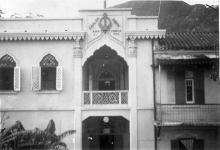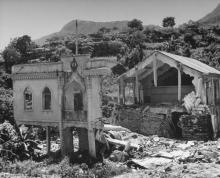The opening of the re-built temple on 7th April 1934 was reported on page 5 of The Hong Kong Telegraph, 1934-04-09:
NEW SIKH TEMPLE
OFFICIAL OPENING ON SATURDAY LAST
The newly erected Sikh Temple at Gap Road was officially opened by the Hon Mr E. D. C. Wolfe on Saturday afternoon in the presence of a large number of local Sikh residents.
After the ceremony the Hon Mr Wolfe was presented with the golden key with which he opened the door.
Mr. Badan Singh, Chairman of the Committee of the Temple, in addressing the gathering, said: This is a great occasion in the history of this institution, and it will not be out of place today if I give a brief history of this Service Hall, or Gurda Wara as it is called in our language, and of our community in this Colony. I have gathered the greater part of this information from Mr Kehr Sing, who is just about to reach the 50th anniversary of his arrival in Hong Kong.
"About 1865 the first batch of 50 Punjabi Sikhs and Mohamedans was taken on in the Hong Kong Police Force. These men proved to be excellent police officers and soon established for themselves a reputation for trustworthiness and devotion to duty – with the result that the Colonial Government has since instituted a regular system of recruitment in India, and the present strength of the Indian branch of the Police Force is now over 700.
"In about 1880 the Hong Kong Government took on the first draft for the local battalion of the Royal Artillery. Including merchants, dealers, and those engaged in other walks of life, the Sikh Community of Hong Kong now numbers over 2000.
The First Building
"In 1900 the Sikh Community felt the need for a building to be used as a Service Hall, and also to provide temporary accommodation for visitors, travellers and new arrivals in the Colony. A Committee was formed, and the Government when approached very generously assisted the scheme by the grant of this site. The staunchest supporter of the Committees application was the late Sir Henry May, Captain Superintendent of Police, and afterwards Governor of Hong Kong.
The old Service Hall, which has been replaced by this fine structure which is open today, was extended from time to time as the Sikh community increased, and it was realised that in time rebuilding scheme on a larger scale would have to be undertaken. In 1906 the adjoining Garden Lot was added to our grounds, and in 1922 all the surrounding un-built on land was applied for as well as the site of the Government School. This application received a warm support of the Hon. Mr E D C Wolfe, and the Government – with the benevolent generosity which it as all times shown to our Community – promised that none of this land would be alienated to other parties: we were not at the time in a position to build immediately, but the Government's generous promise assured us that the land would be available when required. In 1931 we were able to put in hand the rebuilding of the Service Hall, and on our applying for the necessary extension of land – again with the kind support of the Hon Mr Wolfe – the additional area required was granted by the Government.
Thanks To Government.
"It is more than likely that this fine new building would not yet have been built but for the fact that the finances of this institution were put on a sounder footing with the introduction of new rules in 1913 and a new system of accounts by Mr Mahan Singh, who has been our Hon Treasurer for so many years, and other worthy members who from time to time have taken keen interest in the management, such as Messrs Mohinder Singh, and Bishen Singh, whose absence today is greatly felt.
"I should like to take this opportunity of expressing, on behalf of this institution and the Sikh Community in general, our sincere thanks for, and grateful appreciation of the benevolent and generous manner in which the Government has met our needs, and we desire at the same time to express our gratitude to the Hon Mr E D C Wolfe, and his predecessors in the post of Inspector General of Police and to all other officers who have so graciously given us their assistance.
Appeal To Youth.
"I would take this opportunity of making a special appeal to the younger section of our community to give a practical expression of their appreciation of the generous consideration of our needs which the Government has at all times shown, by coming forward to render voluntary service to the Government in the maintenance of peace and order in this Colony. We know that the relation between Government and its subjects should be similar to that existing between parents and their children – and those of us who are capable of rendering assistance to the Government of this Colony should certainly be ready and proud to do so.
"There is another appeal of a different nature which I should like to make today to our whole community. This institution is still in need of funds. Outstanding bills on the new structure amount to some $9000. Money is also needed for overhauling that part of the old building which still remains, and under the conditions of the grant of land we shall have to contribute $2000 towards the cost of a retaining wall on the north side of our site. Further, we are required to rebuild the Crematorium. So it will be seen that this institution must continue for some time to look to our whole community for that generous financial support which it has received since the rebuilding scheme was instituted. The Committee feels that it can rely with confidence on the support.
"In conclusion I should like to express once more our sincere thanks and appreciation to all the generous donors, the Government Officials, the officers commanding the Indian Military Units, their officers and men, and all our guests, for their presence here today which has made this occasion a success. The Committee is also especially indebted to Col Baxter who has very kindly granted permission for the band of his regiment to attend at this function.
After expressing pleasure at having been asked to perform the opening ceremony, the Hon Mr E D C Wolfe remarked that the building reflected the greatest credit on all concerned.
Referring to a suggestion that a new temple may in the near future be built in Kowloon and conducted under a separate management the speaker hoped that when the idea materialised the present Temple Committee would also control that building.
Mr Wolfe reiterated the appeal made by Mr Badan Singh to the younger members to cooperate with the Committee.
After the ceremony the guests were shown around the building and later refreshments were served.
The temple's website notes that "In the early 1940's during the Pacific War, the Gurudwara was bombed twice, sustaining extensive damage." I've set the demolition date to 1944, but if anyone can identify the dates of the two bombings please let us know.
80skid found this photo showing the condition of the temple after the bombing:
http://thesikharmy.files.wordpress.com/2010/01/gurdwara_hongkong.jpg


Comments
Re: Sikh Temple (2nd generation)
Thanks David for unearthing the newspaper articles on the Sikh Temple! Now we are more clear about how the buildings evolved. The book "Sikhs in Hong Kong" may give further details.
Actually it was 80sKid who found the photo of the building damaged by bombs.
Date of bombing
The Sikh Temple was likely bombed on January 16, 1945, when U.S. carrier aircraft hit Hong Kong. In a discussion string elsewhere on Gwulo, there is some speculation that the temple was hit by a 2000-pound bomb that failed to explode. The weight of the falling bomb was sufficient to wreck the temple, and the bomb was buried in the dirt nearby until it was dug up by construction crews recently and defused by the bomb squad.
Sikh Temple
Thanks C (I've updated the source for the photo) and ssuni86. Henry Ching adds the following about the bombing:
I think ssuni86 is probably right about the bombing of the Sikh Temple. If it was not in the big raid on 16th January, 1945 as he suggests, it was very likely in the raid on 21st January, 1945 when a large part of Wanchai was flattened. I think the second bombing of the Temple was on 4th April, 1945 as noted in Harry Ching’s diary.
I've updated the demolition date to 16 Jan 1945 - maybe not 100% accurate but close enough.
Regards, David
Destruction of Sikh Temple during US Air Raid
The Hongkong News (not the most accurate source of news, but still) reported in multiple stories that the Sikh Temple was destroyed during an American air raid on April 4, 1945. This matches up with US military documents I've read, which indicate that B-24 bombers from the 22nd and 43rd Bomb Groups (5th Air Force) hit Hong Kong at midday on April 4. The bombers attempted to hit military targets all over the city, but were badly off target in a number of cases, resulting in civilian casualties. The B-24s were dropping 1,000-pound bombs, which are very large and powerful weapons, so it seems safe to say that the demolition date should be around noon on April 4, 1945. I am no longer very confident of my earlier verdict that the temple was also hit on January 16, 1945, by US Navy carrier aircraft!
Re: huge bomb found in construction site on 6th February 2014
Hi There,
One of those bombs was found leaning close to a foundation pillar in the construction site next to the present day Sikh Temple on 6th February, 2014. The fuse was found intact. The Police had to evacuate a few thousands in a 200 metre radious of the site.
T
Date of bombing
I've just taken a look through the diary pages, and the only mentions of "Sikh" are from April 1945:
http://gwulo.com/search/node/sikh%20type%3Abook_doc_page
I've changed the demolition date to 4th April 1945.
Regards, David
Re: When was the Sikh temple being bombed?
Hi There,
The website of the Sikh Temple mentioned they have been bombed in the early 1940s during the Japanese Invation. They did not specify exactly when though.
T